immune & allergy support
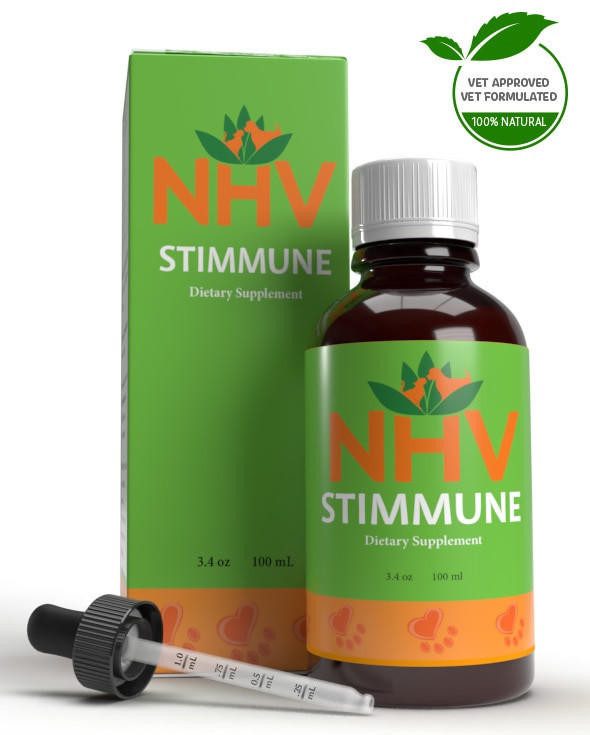
free shipping over $100 (USA & Canada)
1-877-937-4372 the pet expert hotline
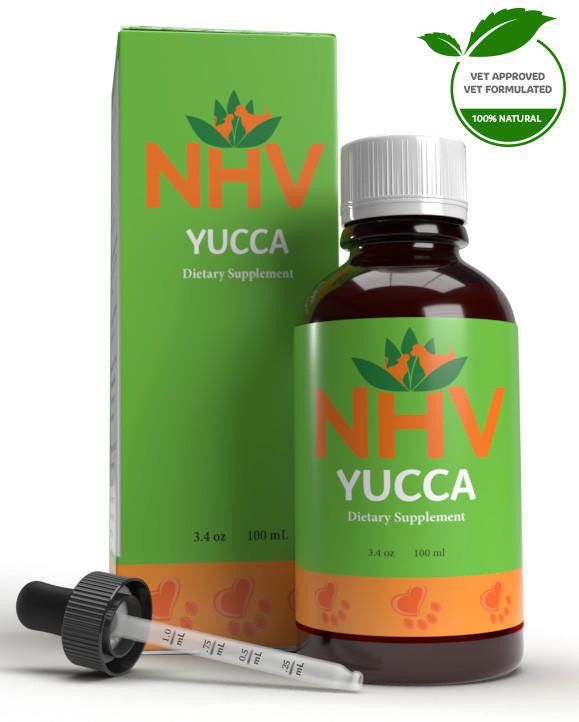
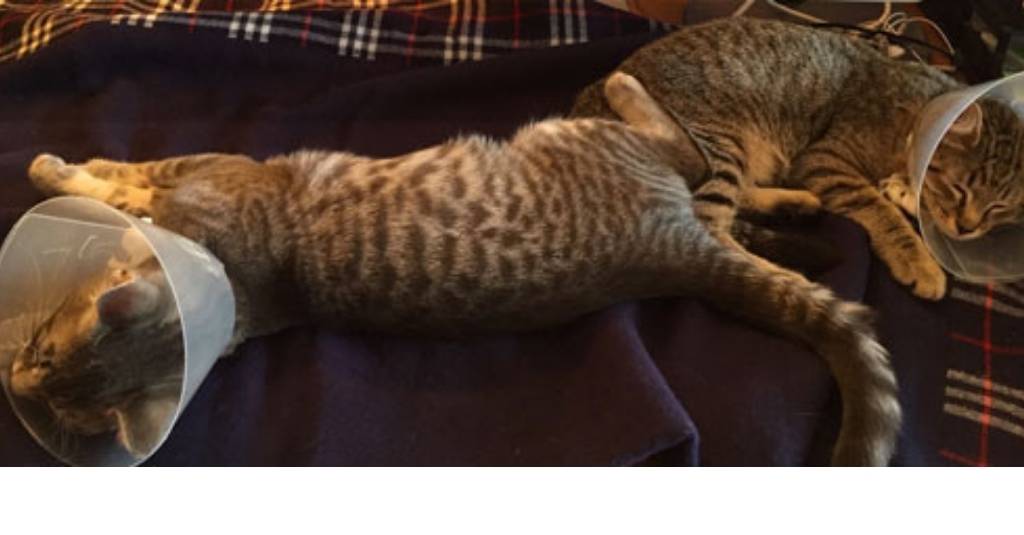
We are pleased to announce two new NHV family members, Jonika and Zimba. These two adorable baby kittens are rescues that we adopted through VOKRA (Vancouver Orphan Kitten Rescue Association).
All VOKRA cats are housed in foster homes, where they get to start life experiencing the love of human companionship while playing with their littermates and other foster furry children. Jonika and Zimba were at two wonderful foster homes. Upon visiting them, it was love at first sight!! What was supposed to be an adoption of a single kitten ended up being of two kittens—so exciting! Both of these kittens had adopted siblings, so it only seemed fitting that we adopt them both.
It is important to spay and neuter all companion animals.
Jonika is our little girl, and Zimba our little boy. It is important to spay and neuter all companion animals. Not only does this help them with long-term health (spaying helps prevent uterine infections and breast tumors, and neutering helps prevent testicular cancer and prostate problems). It also helps control the pet population. According to the ASPCA, approximately 7.6 million animals are in shelters every year.
Did you know that approximately 2.7 million animals are euthanized yearly?
Did you know a cat can become pregnant at the age of 4 months?
In fact, when we picked up Zimba, his foster mum had just taken a new batch of kittens. The mother of this new batch of kittens was only 6 months old, a kitten herself. She was pregnant at four months.
So please spay and neuter your companion animals.
Jonika and Zimba were taken to the vet to be spayed and neutered this week. Neutering is not hard on a male kitten, and recovery is speedy. Spaying is more taxing on a female cat, so they have IV fluids during the procedure. Recovery is also longer for a female.
Our two little fur babies came back home with their cones and are now lovingly called our “coneheads.” She was more groggy from the anesthetic and seemed to be in more discomfort. He, on the other hand, was trying to figure out how to get his cone off. The “backward walking” or trying to push through a wall was not a success!!
It’s interesting how species do not differ, be it humans or animals! Zimba is a typical male—he came home from his surgery and was totally feeling sorry for himself. He was meowing up a storm and wanted to be held, petted, and cooed over. Jonika, on the other hand, was a typical female—“leave me alone and let me suffer in silence.”
To help with recovery and speed up the healing process, both babies are on NHV Stimmune, which helps prevent infections and contains herbs that are antibiotics. NHV Yucca – the yucca is being used as a natural discomfort remedy due to its anti-inflammatory properties and to help with appetite after surgery.
Both our precious little babies are doing well, and we feel so lucky to have them. They have brought a lot of laughter and joy to the NHV Family.
immune & allergy support

Holistic Remedy for Food Allergies and Immune Support in Cats
buy 2 and save $3
3 month supply for a small to medium size
Helps your cat overcome food allergies, skin allergies, and fight infection.

Helps your cat overcome food allergies, skin allergies, and fight infection.
Cats can be allergic to the things they eat and touch, just like people can. With NHV’s Stimmune, your kitty will get potent immune supporting herbs that help support your cat with food allergy reactions, as well as reactions related to fleas, dermatitis, insect bites, diet, and exposure to chemicals and drugs. For seasonal or environmental allergies, please try Alge-Ex for a remedy specifically formulated for your cat.
At NHV, all of our pet products are formulated by a master herbalist as well as a holistic veterinarian having more than 20 years of experience. Some ingredients are even wild-crafted which means they were ethically harvested from their natural environment. Our products are also safe for long-term use and are supplements that animals like to take, including finicky kitties.
If you have questions about holistic remedies for cat allergies to food or any of our wide variety of products, you can ask an NHV expert. Our very supportive professional team of pet experts are here to help and recommend supplements because, at NHV, we want your kitty feeling pawtastic naturally!
Stimmune Is Also Helpful for:
Cats can get food allergies from their diet, and other allergies from their environment when allergens are inhaled, ingested, or absorbed by the body. Once this happens, the immune system overreacts, and this is when your kitty will need extra balance and support.
Read about a senior cat’s Helenda’s transformation using Stimmune.
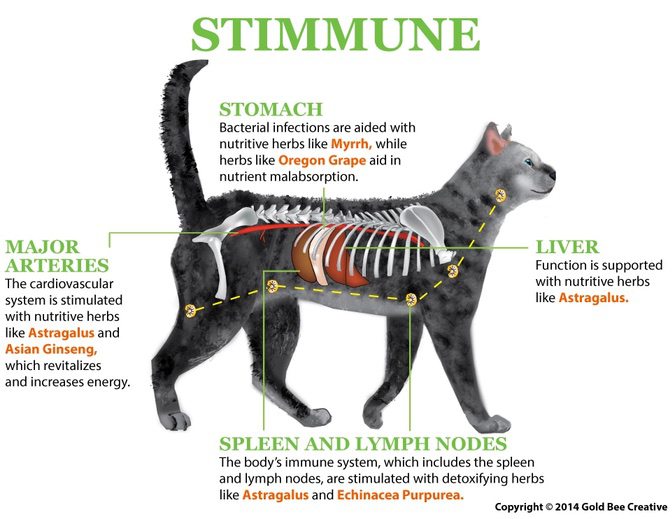
How NHV’s Stimmune Helps Allergies in Cats
Stimmune promotes healthy immune activity and histamine response with five natural herbs formulated to reduce environmental allergies in cats.
Stimmune provides support in addition to conventional treatment for all forms of allergies including pollen allergies in cats.
Select your pet's weight to determine the correct dose.
Cats can be allergic to the things they eat and touch, just like people can. With NHV’s Stimmune, your kitty will get potent immune supporting herbs that help support your cat with food allergy reactions, as well as reactions related to fleas, dermatitis, insect bites, diet, and exposure to chemicals and drugs. For seasonal or environmental allergies, please try Alge-Ex for a remedy specifically formulated for your cat.
At NHV, all of our pet products are formulated by a master herbalist as well as a holistic veterinarian having more than 20 years of experience. Some ingredients are even wild-crafted which means they were ethically harvested from their natural environment. Our products are also safe for long-term use and are supplements that animals like to take, including finicky kitties.
If you have questions about holistic remedies for cat allergies to food or any of our wide variety of products, you can ask an NHV expert. Our very supportive professional team of pet experts are here to help and recommend supplements because, at NHV, we want your kitty feeling pawtastic naturally!
Stimmune Is Also Helpful for:
Cats can get food allergies from their diet, and other allergies from their environment when allergens are inhaled, ingested, or absorbed by the body. Once this happens, the immune system overreacts, and this is when your kitty will need extra balance and support.
Read about a senior cat’s Helenda’s transformation using Stimmune.

How NHV’s Stimmune Helps Allergies in Cats
Stimmune promotes healthy immune activity and histamine response with five natural herbs formulated to reduce environmental allergies in cats.
Stimmune provides support in addition to conventional treatment for all forms of allergies including pollen allergies in cats.
Select your pet's weight to determine the correct dose.
puppy & kitten support
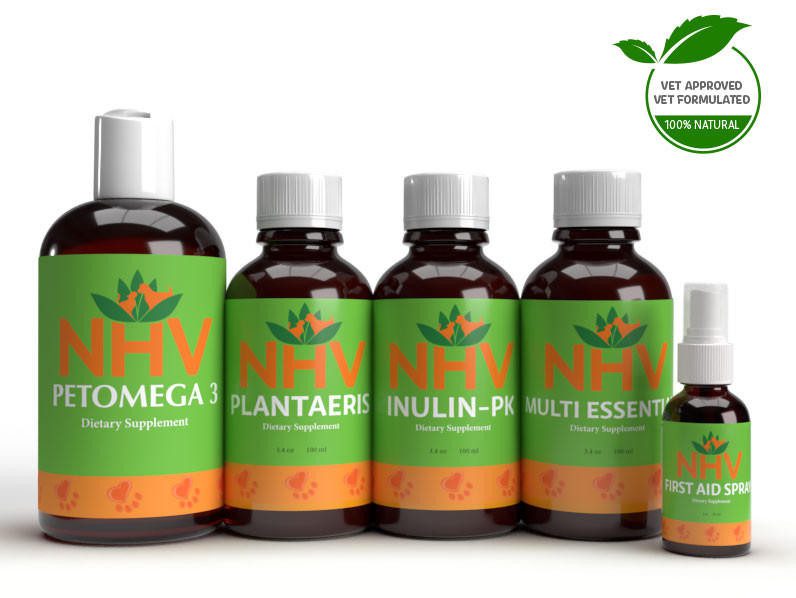
Holistic Dog and Cat Health Supplements
bundle and save with pet expert kits
3 month supply for a small to medium size pet
A new puppy or kitten is sure to bring a smile to any new pet pawrent, but the reality of their arrival can be a little nerve-wracking. Give your new furbaby a great start with NHV’s Puppy and Kitten Health Starter Kit - a comprehensive supplement bundle that helps support overall wellness and vitality.


A new puppy or kitten is sure to bring a smile to any new pet pawrent, but the reality of their arrival can be a little nerve-wracking. Give your new furbaby a great start with NHV’s Puppy and Kitten Health Starter Kit - a comprehensive supplement bundle that helps support overall wellness and vitality.

Holistic Support for Growing Pets
Bringing home a new furry friend is one of the most thrilling feelings in the world! It is essential that your home is appropriately pet-proofed and that you get everything you need for the smoothest start— including the right diet plan, and supplements. Of course, when a new puppy or kitten comes home, that's when reality sets in, and you realize just how much work it is to take care of this little bundle of joy! Puppies love to chew and eat everything in sight, and kittens will hide anywhere they will fit! For all of the shenanigans that your little furbaby is bound to get into, we recommend adding natural supplements to their daily meals as soon as they are vaccinated and weaned. This proactive care plan is beneficial for supporting their overall well-being and giving them a healthy start. It may even be beneficial in slowing down or preventing disease (which may develop due to age, genetics, environment, or poor nutrition). NHV Puppy and Kitten Starter Kit contains Inulin-PK (a deworming aid), Multi Essentials (natural plant-based vitamin and mineral support), Petomega 3 (omega-3 fish oils), Plantaeris (diarrhea support) and First Aid Spray (for minor cuts and wounds).
For pet parents bringing home a purebred pet, get to know your little one’s unique history and personality with our dog and cat breed pages.
How the NHV Puppy and Kitten Health Starter Kit Support Overall Health and Vitality
Puppies and kittens have very sensitive GI tracts, and they love to lick, gobble and chew on things that they aren’t supposed to (like poop), so they are prone to having worm or parasite infections, and upset tummies. Ingredients like elecampane, celandine, milk thistle, and wormwood in Inulin-PK are very gentle aids that encourage the healthy elimination of worms and parasites while helping to maintain a healthy gut. Multi Essentials helps your pet get extra vital nutrients and minerals, which may improve nutrient absorption and metabolism, leading to increases in energy levels and overall vitality. In Petomega 3, the EPA and DHA omega 3s provide critical building blocks for healthy skin development in the coat, eye, heart, and brain, as well as support healthy immune response. Plantaeris contains herbs like thyme which promotes digestion by relaxing muscle cramping and Mullein soothes and lubricates delicate intestinal mucosa while providing gentle support for diarrhea. Ingredients like neem, aloe vera, and tea tree oil in the First Aid Spray contain natural disinfectant properties for cleaning wounds and preventing infection, and the sedative properties of California poppy help reduce stress to encourage faster healing.
The most common health issues in puppies and kittens:
INULIN PK
MULTI ESSENTIALS
PETOMEGA 3
PLANTAERIS
FIRST AID SPRAY
Holistic Support for your Puppy or Kitten
Having a healthy pet means the world to us at NHV. Providing your new furbaby with natural support right out of the gate may prevent infections, chronic illnesses and more. Apart from adding supplements to their daily care plan, learn how a personalized diet can help your new puppy or kitten get the best start in life!
Made with the finest, organically grown, or ethically harvested herbs. Made specifically for pets, vet-formulated and vet approved.
Inulin-PK
Multi Essentials
PetOmega 3
Plantaeris
First Aid Spray
Select your pet's weight to determine the correct dose.
To be taken twice daily. Determine your pet’s weight and then use the easy chart below to determine the correct dose. This is the minimum dosage.
Pet's Weight Dosage
0 - 15 lb = 0.5 ml
16 - 30 lb = 1.0 ml
31 - 45 lb = 1.5 ml
46 - 60 lb = 2.0 ml
61 - 75 lb = 2.5 ml
Over 75 lb = 3.0 ml
How to Administer
Shake well before use. The easiest method is to use the dropper provide and places the drops into your pet’s food or favorite treat. You can also use the dropper and squirt directly into the pet’s mouth.
Some pets can be finicky, if this occurs consider hiding the drops in foods most pet’s love such as fish, chicken or yogurt or a favourite treat. If your pet only eats dry food then soak a few kibbles at feeding time.
For Best Results
Herbal dietary supplements are beneficial to the health and wellbeing of your pet and are safe for long-term use. Every pet responds to natural herbal supplements differently, therefore it is important to be consistent and administer the product daily. Supplements generally take two to four weeks to take effect, however this will vary from one animal to the next.
Product Storage
All NHV Natural Pet Products are pure herbal extracts and contain no artificial additives, preservatives or coloring. Shelf life after opening is 6 months and must be refrigerated after opening.
Cautions and Contraindications
Do not use in pregnant or nursing animals. Speak to your vet before using our products. A second visit is recommended if your pet’s condition does not improve, or deteriorates after continued use of the supplements.
DIRECTIONS AND DOSAGE FOR FIRST AID SPRAY
How to Administer
Topical Spray: Spray several times a day to affected area until healed.
It may some times be necessary to shave or trim your pet’s hair so that the First Aid spray reaches the affected area. If necessary, cover the affected area with gauze dressing.
Caution
Do not spray near or into eyes or nose. May initially sting on open cut
DIRECTIONS AND DOSAGE FOR PETOMEGA-3
Suggested Dosage: To be taken once per day. Add to food based on weight chart.
Therapeutic Dosage: Double the quantity for maximum period of 4 weeks or follow veterinarian advise.
Pet’s Weight Dosage
0-15 lb = ¼ tsp
15-30 lb = ½ tsp
30-60 lb = 1 tsp
60-90 lb = 1 ½ tsp
All information provided by NHV Natural Pet Products is for educational purposes only.
Holistic Support for Growing Pets
Bringing home a new furry friend is one of the most thrilling feelings in the world! It is essential that your home is appropriately pet-proofed and that you get everything you need for the smoothest start— including the right diet plan, and supplements. Of course, when a new puppy or kitten comes home, that's when reality sets in, and you realize just how much work it is to take care of this little bundle of joy! Puppies love to chew and eat everything in sight, and kittens will hide anywhere they will fit! For all of the shenanigans that your little furbaby is bound to get into, we recommend adding natural supplements to their daily meals as soon as they are vaccinated and weaned. This proactive care plan is beneficial for supporting their overall well-being and giving them a healthy start. It may even be beneficial in slowing down or preventing disease (which may develop due to age, genetics, environment, or poor nutrition). NHV Puppy and Kitten Starter Kit contains Inulin-PK (a deworming aid), Multi Essentials (natural plant-based vitamin and mineral support), Petomega 3 (omega-3 fish oils), Plantaeris (diarrhea support) and First Aid Spray (for minor cuts and wounds).
For pet parents bringing home a purebred pet, get to know your little one’s unique history and personality with our dog and cat breed pages.
How the NHV Puppy and Kitten Health Starter Kit Support Overall Health and Vitality
Puppies and kittens have very sensitive GI tracts, and they love to lick, gobble and chew on things that they aren’t supposed to (like poop), so they are prone to having worm or parasite infections, and upset tummies. Ingredients like elecampane, celandine, milk thistle, and wormwood in Inulin-PK are very gentle aids that encourage the healthy elimination of worms and parasites while helping to maintain a healthy gut. Multi Essentials helps your pet get extra vital nutrients and minerals, which may improve nutrient absorption and metabolism, leading to increases in energy levels and overall vitality. In Petomega 3, the EPA and DHA omega 3s provide critical building blocks for healthy skin development in the coat, eye, heart, and brain, as well as support healthy immune response. Plantaeris contains herbs like thyme which promotes digestion by relaxing muscle cramping and Mullein soothes and lubricates delicate intestinal mucosa while providing gentle support for diarrhea. Ingredients like neem, aloe vera, and tea tree oil in the First Aid Spray contain natural disinfectant properties for cleaning wounds and preventing infection, and the sedative properties of California poppy help reduce stress to encourage faster healing.
The most common health issues in puppies and kittens:
INULIN PK
MULTI ESSENTIALS
PETOMEGA 3
PLANTAERIS
FIRST AID SPRAY
Holistic Support for your Puppy or Kitten
Having a healthy pet means the world to us at NHV. Providing your new furbaby with natural support right out of the gate may prevent infections, chronic illnesses and more. Apart from adding supplements to their daily care plan, learn how a personalized diet can help your new puppy or kitten get the best start in life!
Made with the finest, organically grown, or ethically harvested herbs. Made specifically for pets, vet-formulated and vet approved.
Inulin-PK
Multi Essentials
PetOmega 3
Plantaeris
First Aid Spray
Select your pet's weight to determine the correct dose.
To be taken twice daily. Determine your pet’s weight and then use the easy chart below to determine the correct dose. This is the minimum dosage.
Pet's Weight Dosage
0 - 15 lb = 0.5 ml
16 - 30 lb = 1.0 ml
31 - 45 lb = 1.5 ml
46 - 60 lb = 2.0 ml
61 - 75 lb = 2.5 ml
Over 75 lb = 3.0 ml
How to Administer
Shake well before use. The easiest method is to use the dropper provide and places the drops into your pet’s food or favorite treat. You can also use the dropper and squirt directly into the pet’s mouth.
Some pets can be finicky, if this occurs consider hiding the drops in foods most pet’s love such as fish, chicken or yogurt or a favourite treat. If your pet only eats dry food then soak a few kibbles at feeding time.
For Best Results
Herbal dietary supplements are beneficial to the health and wellbeing of your pet and are safe for long-term use. Every pet responds to natural herbal supplements differently, therefore it is important to be consistent and administer the product daily. Supplements generally take two to four weeks to take effect, however this will vary from one animal to the next.
Product Storage
All NHV Natural Pet Products are pure herbal extracts and contain no artificial additives, preservatives or coloring. Shelf life after opening is 6 months and must be refrigerated after opening.
Cautions and Contraindications
Do not use in pregnant or nursing animals. Speak to your vet before using our products. A second visit is recommended if your pet’s condition does not improve, or deteriorates after continued use of the supplements.
DIRECTIONS AND DOSAGE FOR FIRST AID SPRAY
How to Administer
Topical Spray: Spray several times a day to affected area until healed.
It may some times be necessary to shave or trim your pet’s hair so that the First Aid spray reaches the affected area. If necessary, cover the affected area with gauze dressing.
Caution
Do not spray near or into eyes or nose. May initially sting on open cut
DIRECTIONS AND DOSAGE FOR PETOMEGA-3
Suggested Dosage: To be taken once per day. Add to food based on weight chart.
Therapeutic Dosage: Double the quantity for maximum period of 4 weeks or follow veterinarian advise.
Pet’s Weight Dosage
0-15 lb = ¼ tsp
15-30 lb = ½ tsp
30-60 lb = 1 tsp
60-90 lb = 1 ½ tsp
All information provided by NHV Natural Pet Products is for educational purposes only.
anxiety & aggression support
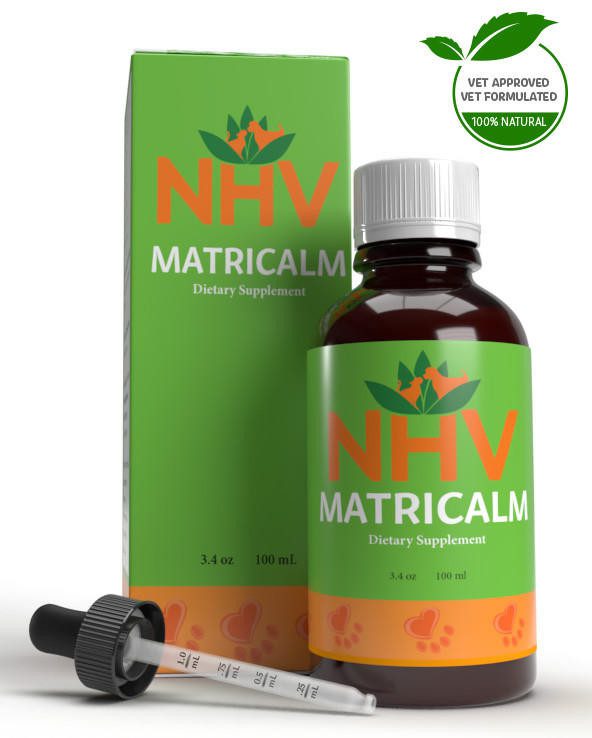
Natural Help for Stress Reduction, Anxiety Relief, Behavioral Problems, and Aggression in Cats
buy 2 and save $3
3 month supply for a small to medium size pet
Matricalm is an all-natural supplement that provides anxiety and stress relief in cats and promotes calm behavior.
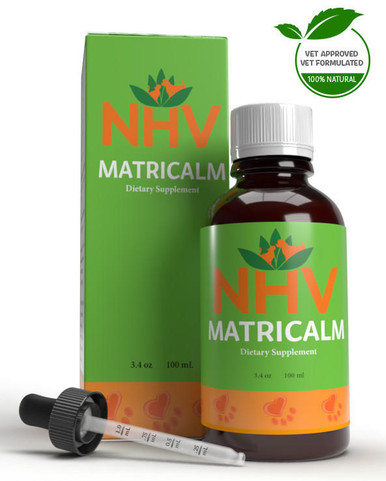
Matricalm is an all-natural supplement that provides anxiety and stress relief in cats and promotes calm behavior.
Help reduce aggressive behavior and provide anxiety and stress relief for your cat with Matricalm, a natural herbal product designed to help reduce excitability in your pet. Cats can become anxious or aggressive when exposed to other animals or to people they are unfamiliar with. When this occurs they may hiss, scratch, howl, or urinate inappropriately.
It’s important to remember that a significant cause of illness in pets results from stress. Helping to keep your cat stress free can help keep them healthier for longer. NHV Pet Experts also often recommend Matricalm for cats dealing with FIV, cancer, kidney issues, hyperthyroidism, and more.
See how NHV Matricalm helped kitty Kimba with yowling and stress.
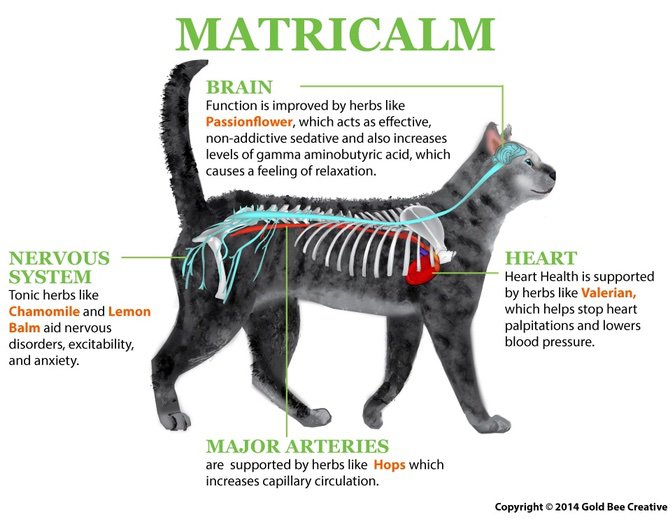
Chamomile – Contains sedative properties. Chamomile also helps the immune system and has a strong affinity for the nervous system.
Passion Flower – An effective, non-addictive sedative. It helps increase gamma-aminobutyric acid (GABA) in the brain, which helps cause a feeling of relaxation. Passion Flower also has strong anti-inflammatory and pain-relieving properties.
Lemon Balm – An aromatic herb used for nervous disorders, excitability, and anxiety. In addition, lemon balm helps lower blood pressure.
Valerian – Helps stop heart palpitations, relaxes spasms, relieves pain, and regulates the nervous system. Valerian also helps improve sleep latency and sleep quality.
Hops – Tension, anxiety, and stress relief in cats. Hops have traditionally been used to help with mood disturbances, such as restlessness and anxiety.
Select your pet's weight to determine the correct dose.
To be taken twice daily. Determine your pet’s weight and then use the easy chart below to determine the correct dose. This is the minimum dosage.
Pet's Weight Dosage
0 - 15 lb = 0.5 ml
16 - 30 lb = 1.0 ml
31 - 45 lb = 1.5 ml
46 - 60 lb = 2.0 ml
61 - 75 lb = 2.5 ml
Over 75 lb = 3.0 ml
How to Administer
Shake well before use. The easiest method is to use the dropper provided and place the drops into your pet’s food or favorite treat. You can also use the dropper and squirt directly into the pet’s mouth.
Some pets can be finicky. If this occurs, consider hiding the drops in foods most pets love, such as fish, chicken, yogurt or a favorite treat. If your pet only eats dry food, then soak a few kibbles at feeding time.
For Best Results
Herbal dietary supplements are beneficial to the health and well-being of your pet and are safe for long-term use. Every pet responds to natural herbal supplements differently. Therefore, it is important to be consistent and administer the product daily. Supplements generally take two to four weeks to take effect; however, this interval will vary from one animal to the next.
Product Storage
All NHV Natural Pet Products are pure herbal extracts and contain no artificial additives, preservatives, or coloring. Shelf life after opening is six months, and it must be refrigerated after opening.
Cautions and Contraindications
Do not use Matricalm for cats as stress relief in pregnant or nursing animals. Speak to your vet before using our products. A second visit is recommended if your pet’s condition does not improve or deteriorates after the continued use of the supplements.
All information provided by NHV Natural Pet Products is for educational purposes only.
Help reduce aggressive behavior and provide anxiety and stress relief for your cat with Matricalm, a natural herbal product designed to help reduce excitability in your pet. Cats can become anxious or aggressive when exposed to other animals or to people they are unfamiliar with. When this occurs they may hiss, scratch, howl, or urinate inappropriately.
It’s important to remember that a significant cause of illness in pets results from stress. Helping to keep your cat stress free can help keep them healthier for longer. NHV Pet Experts also often recommend Matricalm for cats dealing with FIV, cancer, kidney issues, hyperthyroidism, and more.
See how NHV Matricalm helped kitty Kimba with yowling and stress.

Chamomile – Contains sedative properties. Chamomile also helps the immune system and has a strong affinity for the nervous system.
Passion Flower – An effective, non-addictive sedative. It helps increase gamma-aminobutyric acid (GABA) in the brain, which helps cause a feeling of relaxation. Passion Flower also has strong anti-inflammatory and pain-relieving properties.
Lemon Balm – An aromatic herb used for nervous disorders, excitability, and anxiety. In addition, lemon balm helps lower blood pressure.
Valerian – Helps stop heart palpitations, relaxes spasms, relieves pain, and regulates the nervous system. Valerian also helps improve sleep latency and sleep quality.
Hops – Tension, anxiety, and stress relief in cats. Hops have traditionally been used to help with mood disturbances, such as restlessness and anxiety.
Select your pet's weight to determine the correct dose.
To be taken twice daily. Determine your pet’s weight and then use the easy chart below to determine the correct dose. This is the minimum dosage.
Pet's Weight Dosage
0 - 15 lb = 0.5 ml
16 - 30 lb = 1.0 ml
31 - 45 lb = 1.5 ml
46 - 60 lb = 2.0 ml
61 - 75 lb = 2.5 ml
Over 75 lb = 3.0 ml
How to Administer
Shake well before use. The easiest method is to use the dropper provided and place the drops into your pet’s food or favorite treat. You can also use the dropper and squirt directly into the pet’s mouth.
Some pets can be finicky. If this occurs, consider hiding the drops in foods most pets love, such as fish, chicken, yogurt or a favorite treat. If your pet only eats dry food, then soak a few kibbles at feeding time.
For Best Results
Herbal dietary supplements are beneficial to the health and well-being of your pet and are safe for long-term use. Every pet responds to natural herbal supplements differently. Therefore, it is important to be consistent and administer the product daily. Supplements generally take two to four weeks to take effect; however, this interval will vary from one animal to the next.
Product Storage
All NHV Natural Pet Products are pure herbal extracts and contain no artificial additives, preservatives, or coloring. Shelf life after opening is six months, and it must be refrigerated after opening.
Cautions and Contraindications
Do not use Matricalm for cats as stress relief in pregnant or nursing animals. Speak to your vet before using our products. A second visit is recommended if your pet’s condition does not improve or deteriorates after the continued use of the supplements.
All information provided by NHV Natural Pet Products is for educational purposes only.
Published: July 24, 2016